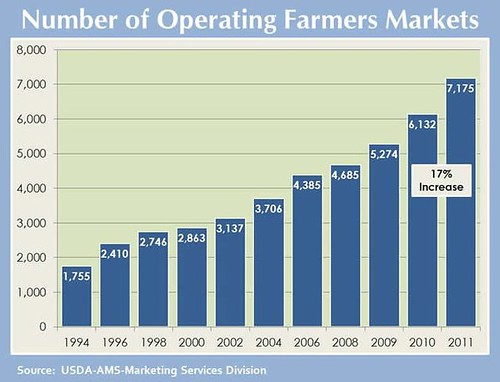I don't know about you but I find it wildly encouraging to know that farmers' markets are rapidly growing in popularity nationwide. There's something basic about it. Basic and organized. These aren't just disparate farmers selling their zucchini and cherries in rickety plywood stands along dusty dirt roads for a little extra pocket money, anymore (put a dollar in the can, take a couple of cucumbers).
These are mostly local farmers banding together to sell their produce at fair rates direct to the consumer. And to add and extra layer of competition, a growing number are offering organic foods and free-range meats.
One of my favorite stories and a HUGE local success story is of a fourth generation fishing family in Muskegon opening up a new, local market to compete and survive. It was started by one of the younger fishermans' wives who called her stand at the farmer's market "The Fishmonger's Wife" and they sell fresh, locally caught Lake Michigan whitefish right there at the Farmer's Market. It is WILDLY successful and the only market access Muskegonites have to the locally fished whitefish.
Here's a wonderful chart from the USDA showing a rapid 17% jump in the number of farmers' markets nationwide from 2010 to 2011, the largest 1 year jump since the USDA started recording these types of things:

Michigan's number of farmers' markets alone grew from 90 in 2001 to 336 in 2011.
You know I love to brag: Muskegon has had a farmers' market for a long stinkin' time and is among the largest farmers' markets in the country. Home is always best of course...but the variety of foods is fantastic. These folks in this pic grow, dry, and sell their own brand of beans (Fun Fact: Michigan is America's #1 producer of black beans):


With the national growth in farmers' markets, the drumbeat of calls for redirecting Federal investment from factory farms to smaller, more local farms is growing louder and with quite a bit more economic force behind it as Americans show their willingness and ability to buy locally produced foods from local farmers.
The Union of Concerned Scientists cited U.S. Department of Agriculture figures showing the number of farmers markets in Michigan grew from 90 in 2001 to 336 in 2011. The group wants the federal government to invest more of its agricultural funding in local markets, rather than industrial farming.
Nationally, farmers' markets more than doubled between 2000 and 2010, growing from 2,863 to 6,132, according to the group.
"On the whole, farmers markets have seen exceptional growth, providing local communities with fresh food direct from the farm," Jeffrey O'Hara, author of the report and an economist with the Center's Food and Environment Program, said in a press release.
"If the federal government diverted just a small amount of the massive subsidies it lavishes on industrial agriculture to local markets, it would generate thousands of new jobs in Michigan, and tens of thousands of new jobs across the country."
Citing Congressional Budget Office figures, the group said the USDA last year spent more than $13 billion to assist large industrial farms while investing less than $100 million in local and regional food system farmers.
A Michigan Department of Agriculture analysis concluded that if every Michigan family spent just $10 weekly on locally produced food, it would circulate nearly $37 million in the state economy, the group said.
From The Detroit News
When times get tough, people don't just SIT AROUND waiting for things to change or waiting for our bickering representatives to fix things...our communities go out and do it ourselves. It would go a lot faster if our elected representatives listened to us and what we wanted and helped us move in that direction. But no matter...when we choose to change, we can make it happen.
No comments:
Post a Comment